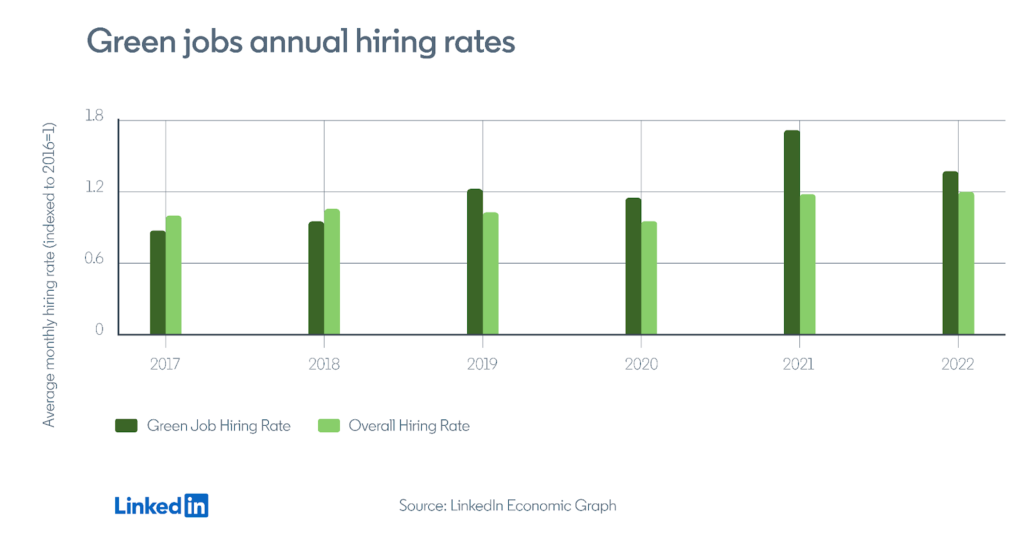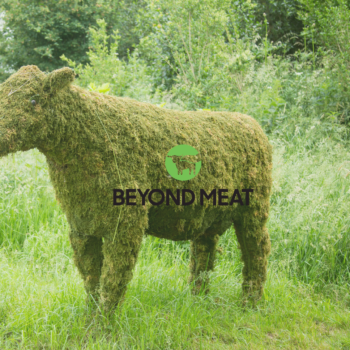|
|
In today’s rapidly changing world, the urgency to address environmental challenges and promote sustainable practices is more pressing than ever. Industries everywhere seek to integrate sustainability into their operations, which means they need skilled professionals in this area to grow and achieve their sustainability goals.
If you’re passionate about positively impacting the planet while building a rewarding career, this is an exciting time to get into sustainability. The field offers plenty of job opportunities, allowing you to be part of innovative solutions and work in an industry that values the planet as much as profits. So, whether you’re interested in designing green products, managing waste, or creating policies to protect the environment, there’s a role for you here.
In this comprehensive guide, we’ll delve into sustainability, exploring its burgeoning market for employment and the diverse array of entry-level sustainability jobs available. We’ll also examine the significance of these roles, shedding light on why they are pivotal in driving positive change and uncovering the essential qualifications required to thrive in this field.
Furthermore, we’ll explore various entry-level sustainability positions, providing insights into their responsibilities, average salaries, and potential employers. Lastly, we’ll equip you with practical strategies to bolster your candidacy and maximize your chances of landing a coveted entry-level sustainability job.
Key Takeaways
- The sustainability job market is expanding, offering numerous opportunities for entry-level professionals to make a meaningful impact.
- Entry-level sustainability roles provide valuable experience and serve as stepping stones to advanced positions in the field.
- Qualifications such as a bachelor’s degree in environmental science, relevant work experience, and certifications can enhance your competitiveness in the job market.
- Leveraging online job boards, networking, and professional development opportunities can help you secure an entry-level sustainability job.
- Corporate sustainability professionals play a critical role in driving sustainability initiatives within organizations, with opportunities for growth and advancement.
Sustainability and the Sustainability Jobs Market
In recent years, the idea of sustainability has caught on. More and more people are talking about it. This isn’t just a trend; it’s a shift in our thinking about our planet and its future.
Sustainability is all about finding ways to meet our needs today without harming the chances of future generations to meet theirs. It touches everything from how we make and use products to how we protect natural resources.
The global sustainability and green technology market is on a remarkable growth path. Data from Statista shows an exciting trend: in 2022, this market was valued at about 13.76 billion U.S. dollars. But the future looks even brighter. By 2030, it’s expected to soar to nearly 62 billion U.S. dollars. That means the industry is looking at an average yearly growth rate of 20.8% from 2023 through 2030.

Image Source: https://www.statista.com/statistics/1319996/green-technology-and-sustainability-market-size-worldwide/
Such a rapid expansion highlights how much value and investment are pouring into green technology and sustainable practices, and this is driving the creation of diverse sustainability roles across various industries. From renewable energy to waste management, sustainability jobs encompass multiple sectors, reflecting the growing recognition of environmental, social, and economic considerations.
According to the World Economic Forum’s Future of Jobs Report, which includes data from LinkedIn, hiring for green roles has been growing faster than the overall hiring rate worldwide since 2020. This trend shows that jobs focused on sustainability are becoming a significant part of the employment landscape.

Image Source: https://www.weforum.org/agenda/2023/04/future-of-jobs-is-green-2023-climate-change-labour-markets/
For job seekers, this is excellent news. In times when the job market might be uncertain or slowing down, sustainability jobs are a reliable choice. Positions such as sustainability analysts, specialists, and managers are not only in demand but have also been highlighted by LinkedIn as some of the fastest-growing roles globally since 2019.
Entry Level Sustainability Jobs and Why They Are Important
If you’re eager to kickstart a career in sustainability, starting with an entry-level job is a smart move. These roles offer the perfect gateway into the industry, laying the essential groundwork for your professional journey.
Entry-level sustainability jobs refer to positions suitable for individuals starting their careers in sustainability. These jobs typically involve working towards creating a more sustainable future, whether it be through environmental conservation, renewable energy, sustainable supply chain management, or implementing socially responsible practices.
Entry-level sustainability jobs are important because they provide a pathway for individuals to contribute to a more sustainable world right from the beginning of their careers. These jobs allow young professionals to learn the ins and outs of sustainability practices, gain practical experience, develop skills, and positively impact the environment and society.
Furthermore, starting at the entry level is vital to nurturing future leaders in sustainability. These positions encourage fresh talent to bring innovative ideas to the table and lead positive changes within organizations. So, if you’re passionate about contributing to a greener planet and ready to take on the challenge, an entry-level job in sustainability could be the perfect beginning for your career path.
Qualifications for Entry-Level Sustainability Jobs
Embarking on a career in sustainability begins with understanding what qualifications are typically needed for entry-level positions. While the exact requirements can differ based on the job and industry, some common elements aspiring professionals should know are:
- Educational Background: A bachelor’s degree in environmental science, sustainability, engineering, business, or a similar field is commonly preferred. This provides a solid knowledge base covering critical topics like environmental policy, natural resource management, and sustainability principles.
- Relevant Work Experience: Practical experience in the field, even early on, is invaluable. This could be jobs in related sectors or positions demonstrating your commitment and understanding of environmental issues.
- Internships: Internships offer hands-on experience and insights into the sustainability sector. They’re a plus for any resume, showing you’ve applied academic learning in a real-world setting.
- Certifications: Obtaining certifications relevant to sustainability can significantly boost a candidate’s marketability. These include credentials in sustainable development, renewable energy systems, waste management, and environmental impact assessment.
Together, these qualifications form the backbone of a robust application for entry-level roles in sustainability. Employers look for candidates with theoretical knowledge, practical experience, and a demonstrated passion for environmental stewardship.
How to Find Entry-Level Sustainability Jobs
Navigating the job search process can be daunting, but with the right approach, you can uncover exciting opportunities in sustainability. Here are some effective strategies to maximize your job hunt:
- Utilize Online Job Boards: Websites such as LinkedIn, Indeed, and Glassdoor are rich resources for discovering available positions. These platforms list various job openings across various sustainability sectors while also letting you create job alerts and apply directly through employers’ websites.
- Explore Specialized Sustainability Portals: Dedicated sustainability portals, such as Greenbiz, Idealist, Omprakash, and UNESCO, offer comprehensive information about different aspects of sustainability. That includes a concentrated selection of roles specifically in this niche. These sites are excellent for finding positions that precisely match your area of interest within the sustainability sphere.
- Network with Industry Professionals: Building connections with individuals already working in sustainability can provide insider knowledge and advice. These contacts may alert you to upcoming openings and deliver recommendations that elevate your application.
- Attend Industry Events: Conferences, seminars, and workshops related to sustainability are suitable for expanding your knowledge and meeting professionals in the field. These events can offer direct access to potential employers and insights into emerging trends within the industry.
- Leverage Social Media Platforms: LinkedIn, in particular, is a powerful tool for job seekers. You can significantly broaden your network by following companies and influencers in the sustainability sector, joining relevant groups, and engaging with content. LinkedIn’s job search functionality also allows you to find openings and even discover which companies might be looking for candidates like you.
- Explore Hidden Job Opportunities: Many jobs never get advertised publicly and are filled through word-of-mouth or internal referrals. Increasing your visibility and actively networking can unveil these hidden gems.
Industries Where Sustainability Professionals Are Sought After
Sustainability professionals are in growing demand across various industries as businesses and organizations recognize the importance of integrating sustainable practices into their operations. Here’s a look at some sectors where sustainability experts are particularly in demand:
Technology
The technology sector is at the forefront of innovation, with companies striving to minimize their environmental footprint and promote sustainability. Technology firms actively seek sustainability professionals to drive their environmental initiatives forward, from renewable energy initiatives to optimizing data center designs for energy efficiency.
Roles such as sustainability managers, research analysts, ESG analysts, and data analysts focusing on sustainability are particularly sought after in this industry.
Energy
As the world transitions towards cleaner and more sustainable energy sources, the energy sector is experiencing a significant transformation. Renewable energy companies are ramping up their efforts to expand their operations and reduce reliance on fossil fuels. Sustainability professionals play a critical role in ensuring that energy projects are developed and managed in an environmentally responsible manner.
Roles such as renewable energy project managers, sustainability consultants, and environmental scientists are in high demand in this sector.
Manufacturing
The manufacturing industry is under increasing pressure to adopt sustainable practices and reduce its environmental impact. Sustainability professionals are instrumental in helping manufacturing companies implement strategies to minimize waste, improve resource efficiency, and enhance supply chain sustainability.
Roles such as sustainability coordinators, environmental managers, program managers, and supply chain analysts are essential for driving sustainability initiatives within manufacturing firms.
Healthcare
The healthcare sector is not immune to the growing emphasis on sustainability, as hospitals and healthcare facilities strive to reduce their carbon footprint and promote environmental stewardship. Sustainability professionals in the healthcare industry focus on initiatives such as energy conservation, waste management, and sustainable procurement practices.
Roles such as sustainability coordinators, environmental health specialists, and green building consultants are in demand to support sustainability efforts in healthcare settings.
Agriculture and Food Production
The agriculture and food production industry faces sustainability challenges related to land use, water resources management, and food waste. Sustainability professionals in this sector work on initiatives to promote regenerative agriculture, reduce greenhouse gas emissions, and improve food supply chain sustainability.
Roles such as agricultural sustainability specialists, food waste reduction coordinators, and sustainable agriculture researchers are essential for advancing sustainability goals in agriculture and food production.
Entrepreneurship
Entrepreneurs increasingly focus on sustainable business models that prioritize environmental and social impact alongside profitability. Sustainability professionals in entrepreneurship may work on developing sustainable products, implementing eco-friendly manufacturing processes, or launching green startups.
Roles such as sustainable business consultants, eco-entrepreneurs, and impact investors are crucial in driving sustainability innovation in the entrepreneurial space.
Military and Public Service
The military and public service sectors also embrace sustainability initiatives to reduce their environmental footprint and enhance operational efficiency. Sustainability professionals in these sectors may work on initiatives such as renewable energy integration, energy conservation, and climate resilience planning.
Roles such as sustainability officers, environmental planners, and resilience specialists are in demand to support sustainability efforts in military and public service organizations.
Community Development
Community development involves assisting local governments, nonprofit organizations, and community groups in implementing sustainability initiatives at the grassroots level. Sustainability professionals in this sector may work on projects related to sustainable urban planning, environmental education, and community resilience.
Roles such as sustainability consultants, community organizers, and environmental outreach specialists are essential for driving sustainability initiatives at the community level.
Consulting
Consulting firms across various industries increasingly incorporate sustainability into their service offerings to meet client demands and regulatory requirements. Sustainability consultants provide expertise and guidance to organizations developing and implementing sustainability strategies.
Roles such as sustainability consultants, corporate responsibility advisors, and ESG analysts are in high demand in consulting firms, where they assist clients in navigating complex sustainability challenges and opportunities.
Exploring Opportunities: Top Entry-Level Sustainability Roles

With a clearer understanding of the industries ripe for sustainability talent, it’s time to delve into some entry-level roles that combine rewarding experiences and competitive compensation. These positions are accessible with the right blend of experience and education.
Corporate Sustainability Professional
Corporate sustainability professionals play a pivotal role in developing and implementing sustainability strategies within organizations. Responsibilities may include conducting ESG (Environmental, Social, and Governance) assessments, engaging stakeholders to drive sustainable practices, and identifying opportunities for sustainability improvement in different areas, including but not limited to energy efficiency, waste reduction, responsible sourcing, social impact initiatives, and sustainability programs. To get a job in this field, candidates must possess skills in sustainability management, business strategy, and stakeholder engagement.
The average salary for corporate sustainability professionals ranges from $60,000 to $80,000 annually. Companies such as Google, Patagonia, and Unilever are known for their commitment to sustainability and often hire professionals in this role.
Sustainability Coordinator
Sustainability Coordinators work within companies or organizations to oversee sustainability projects from the ground up. Whether it’s reducing energy consumption, coordinating recycling initiatives, or ensuring compliance with environmental regulations, they ensure that all operations adhere to sustainability goals.
This role often serves as a starting point in the sustainability field, offering an average annual salary of around $50,000 to $70,000. Amazon, Microsoft, Walmart, Coca-Cola, and Pepsi are some companies hiring for sustainability coordinators.
Environmental Analyst
Environmental Analysts play a crucial role in gathering and analyzing data related to environmental sustainability performance. Their insights help shape policies and practices aimed at minimizing ecological footprints. They work across sectors, providing critical support in decision-making processes for sustainability projects.
Entry-level analysts can earn between $45,000 and $65,000, depending on their specific role and sector. Environmental Resources Management (ERM), Tetra Tech, AECOM, Golder Associates, and Jacobs are at the forefront of hiring environmental analysts.
Green Building Specialist
The construction industry has seen a surge in demand for Green Building Specialists. These professionals focus on designing, constructing, and maintaining buildings using strategies that reduce their environmental impact and enhance energy efficiency. Working closely with architects and engineers, these professionals ensure that new constructions meet green certification standards.
The starting salary for this role usually falls between $55,000 and $75,000 annually. As sustainable building practices continue to gain momentum, the need for qualified Green Building Specialists is expected to rise. Companies like Skanska USA, Turner Construction Company, HOK, DPR Construction, and Gilbane Building Company actively seek green building specialists to join their teams.
Renewable Energy Analyst
Renewable Energy Analysts are pivotal in evaluating the viability and impact of renewable energy projects such as wind, solar, and hydroelectric power. They analyze market trends, investment opportunities, and tech innovations to advise companies and policymakers on sustainable energy solutions.
An entry-level Renewable Energy Analyst can expect a salary range from $50,000 to $70,000 annually, with opportunities in both the public and private sectors. If you’re interested in this role, consider checking NextEra Energy, Ørsted, Iberdrola Renewables, Invenergy, and Pattern Energy Group for opportunities.
Environmental Educator
Environmental Educators work in various settings, including schools, non-profits, and governmental organizations, to raise awareness about environmental issues and promote sustainability practices among the public. They develop educational materials, conduct workshops, and organize community programs focused on conservation efforts.
Starting salaries for Environmental Educators typically range from $40,000 to $60,000 annually. National Audubon Society, Sierra Club, Environmental Defense Fund (EDF), World Wildlife Fund (WWF), and The Nature Conservancy usually have openings for entry-level environmental educators.
Sustainability Consultant
Sustainability Consultants advise businesses looking to implement sustainable practices into their operations. They assess environmental impacts, identify areas for improvement, and develop strategies that enhance sustainability while also considering the economic bottom line.
Entry-level consultants can expect an average annual salary between $55,000 and $75,000, depending on their expertise and the industries they serve. McKinsey & Company’s Sustainability & Resource Productivity practice, Deloitte’s Sustainability services, and BCG’s Center for Climate Action have a growing demand for sustainability consultants.
Recycling Coordinator
Recycling Coordinators are essential in managing waste reduction efforts within municipalities or organizations. They oversee recycling programs, develop waste reduction strategies, and engage with the community to promote recycling efforts.
The salary for a Recycling Coordinator can vary widely based on the locality and scope of their programs but typically starts at around $45,000 to $65,000 annually. Waste Management, Republic Services, Veolia North America, Clean Harbors, and Recology are some firms that frequently recruit for waste management, environmental conservation, and sustainability roles, including recycling coordinators.
Each role above offers a unique opportunity to contribute to the sustainability movement while building a meaningful career. Whether your passion lies in corporate strategy, education, energy production, or waste management, there’s a pathway for you to make an impact.
Increasing Your Chances of Securing an Entry-Level Sustainability Job

Securing an entry-level job in sustainability can be competitive. Yet, with the right approach and preparation, you can significantly increase your chances of landing a role that aligns with your passions and goals. Here are strategic steps to boost your prospects:
Work on Developing Relevant Skills
To stand out in the pool of candidates for entry-level sustainability roles, sharpening the most sought-after skills in the field is crucial. A critical insight came from Sue Duke, LinkedIn’s head of global public policy. During an interview with Business Insider, Duke pointed out, “We’re seeing workers with green skills being hired at a higher rate than those without. So that means getting ready for this is going to be good for you as well as good for the planet.”
This observation underscores the importance of having a robust skillset that caters directly to the needs of the sustainability sector. Entry-level jobs in this area require a balanced blend of technical and soft skills.
Technical Skills
- Understanding Environmental Conservation Practices: Knowledge of current methods and strategies for conservation, including practices that businesses can adopt to minimize their environmental footprint.
- Sustainable Design Principles: Familiarity with the principles of designing products and systems in a way that reduces waste and lowers environmental impact.
- Renewable Energy Technologies: Insights into how renewable energy sources work, including solar, wind, and hydroelectric power, and how they can be integrated into existing energy systems.
- Data Analysis: The ability to collect, process, and analyze data is crucial. According to Harvard Business School Online, being skilled in tracking and interpreting the results of sustainability initiatives—and understanding their impact on different business segments—is invaluable. This includes mastering data visualization tools to communicate findings and influence business strategy effectively.
Soft Skills
- Communication: The ability to articulate sustainability concepts clearly and persuasively to various audiences is essential. This includes writing reports, making presentations, and engaging stakeholders.
- Problem-solving: Identifying challenges and developing innovative solutions is key in driving sustainability efforts forward.
- Adaptability: The field of sustainability is constantly evolving, so being open to change and quickly adapting to new information or strategies is crucial for success.
- Collaboration: Since sustainability often requires cross-functional efforts, knowing how to work effectively in teams and with partners from diverse backgrounds and disciplines is vital.
- Leadership: Showing initiative and the ability to lead projects or guide teams towards sustainability goals can set you apart as a candidate ready for more responsibility.
Boost Qualifications with Certifications
Earning relevant certifications can significantly enhance your qualifications and demonstrate your commitment to sustainability. Certifications can set you apart from other candidates by showcasing your specialized knowledge and commitment to continuing education. They are tangible evidence of your skills and dedication to positively impacting the environment. Here are some certifications that can significantly enhance your profile:
- LEED Green Associate: The LEED (Leadership in Energy and Environmental Design) Green Associate credential is a globally recognized certification. It demonstrates a comprehensive understanding of green building practices and principles. This certification is ideal for anyone looking to prove their commitment to environmentally responsible construction and design.
- Certified Sustainability Professional (CSP): The Certified Sustainability Professional designation is another respected credential that showcases expertise in implementing sustainable business practices. Earning this certification indicates a deep understanding of various business operations’ economic, environmental, and social impacts and the ability to develop strategies that lead to sustainable outcomes.
- ENERGY STAR Certification: Focuses on energy efficiency management and practices. It’s highly relevant for roles aiming to reduce energy consumption within buildings and operations.
- ISO 14001 Environmental Management System (EMS) Certification: Demonstrates expertise in creating and managing effective environmental management systems according to international standards.
- BREEAM Accredited Professional: Like LEED, BREEAM (Building Research Establishment Environmental Assessment Method) focuses on building sustainability but is more widely recognized in Europe. It offers credentials for professionals designing, constructing, and maintaining sustainable buildings.
- Project Management Professional (PMP)® focusing on sustainability: Although not exclusively a sustainability certification, project management skills can be invaluable in sustainability. Tailoring project management expertise toward sustainability initiatives can make your skill set even more attractive.
Utilize LinkedIn and Professional Networking
LinkedIn is a powerful tool for job seekers to connect with professionals in the sustainability field, learn about job opportunities, and showcase their skills and experiences. Here are some effective strategies to leverage LinkedIn for your job search, helping you stand out and connect with the right opportunities:
- Build and Optimize Your LinkedIn Profile: An optimized LinkedIn profile is crucial to attracting entry-level sustainability job opportunities. Highlight your educational background, relevant coursework, internships, and any sustainability-related projects or initiatives you have worked on and ensure they fit within the full job description of the job you are targeting. Utilize keywords related to sustainability in your profile summary and headline to make it easier for recruiters to find you.
- Network Actively: Networking on LinkedIn is valuable for finding entry-level sustainability job leads. Join sustainability-focused groups and participate in discussions. Connect with professionals in the field, including recruiters and individuals working in sustainability roles. Engage with their posts, share relevant content, and establish meaningful connections.
- Share and Engage With Content: Share articles, news, or insights related to sustainability that interest you. This can help establish your voice in the field. You can also comment on posts by others in your network or groups and offer thoughtful insights or ask questions to spark discussion. Additionally, use LinkedIn’s publishing platform to write articles about sustainability topics you’re passionate about to increase your visibility to potential employers.
- Use LinkedIn Job Search Features: LinkedIn’s job search features allow you to customize your job search with filters such as location, industry, and experience level. They also let you research companies, helping you learn about a potential employer. Moreover, for many job listings on LinkedIn, the platform offers an “Easy Apply” feature where you can submit your profile as an application with just a few clicks. While convenient, remember to customize your application when possible to stand out.
Prepare Thoroughly for Interviews
When preparing for interviews, understand the job details carefully, research the organization’s sustainability initiatives, familiarize yourself with industry trends and challenges, and be prepared to discuss your experiences and contributions to sustainability projects. Highlight your knowledge of critical environment issues, your passion for sustainability, and your ability to drive positive organizational change.
Privacy Considerations When Applying for Entry-Level Sustainability Jobs
When applying for entry-level sustainability jobs, it’s essential to balance sharing enough information to be a compelling candidate and protecting your privacy. Here are some detailed considerations to help you manage your personal information safely:
- Use a Professional Email Address: Create an email address that you use exclusively for job applications. Ensure it includes your name or a professional variation, avoiding nicknames or informal terms.
- Avoid Sharing Sensitive Personal Information If It’s Not Necessary: There’s no need to include details like your Social Security Number, driver’s license number, bank account details, or date of birth on your resume or application forms unless required explicitly for background checks—and only after you have confirmed the legitimacy of the request.
- Regularly Update Your Privacy Settings on Job Search Platforms or Career Websites: Platforms like LinkedIn allow you to control who sees your profile and posts. Familiarize yourself with these settings and adjust them according to your comfort level with public visibility.
- Be Cautious When Sharing Your Resume; Consider Removing Personal Contact Details: Instead of listing your home address or phone number, you might only provide your city and state along with your email address. You can always share more contact information later in the process when you feel comfortable with a potential employer.
- Research the Companies You Are Applying To and Ensure They Are Reputable: Before submitting your application, do a thorough check of the company’s online presence through their official website, news articles, and reviews from employees. This can help ensure you’ll share your information with a legitimate entity.
- Stay on Top of Privacy Laws and Regulations: Be aware of your region’s data protection and privacy laws (such as GDPR in Europe). Knowing your rights can help you make informed decisions about the information you share.
- Be Wary of Unsolicited Job Offers: Exercise caution if you receive a job offer without having applied or interviewed for the position, especially if it seems too good to be true. Scammers may use fake job offers to gather personal information or financial details.
- Use Secure Websites for Job Applications: Ensure the website is secure when applying for jobs online (look for URLs starting with “https://” and a padlock icon). Avoid submitting personal details over unsecured or public Wi-Fi networks.
- Limit What You Share on Social Media: While having a professional online presence is essential, be cautious about what personal information you share on social media platforms. Even details about your job search should be shared judiciously to avoid attracting unwanted attention or scams.
- Be Selective About References: Rather than listing references directly on your resume, consider including a line that says “References available upon request.” This way, you can control who contacts your references and ensure their information is only shared with reliable potential employers.
- Ask Questions: If an employer or recruiter asks for personal information, it’s fair to inquire about how it will be used and stored and the measures they take to protect it. A legitimate employer will understand your privacy concerns and provide clear answers.
By taking these precautions, you can maintain privacy and security in your job search without hindering your chances of finding a rewarding entry-level position in sustainability. Remember, your safety and privacy are paramount. Always trust your instincts—if something feels off about an interaction or job offer, it’s okay to step back and reassess.
Conclusion
The world is shifting towards a more sustainable future, and entry-level sustainability jobs are your gateway to being part of this positive change. As we explored the various aspects of these jobs, from what they entail to how to secure them, it’s evident that they offer a unique opportunity to contribute to a cleaner and greener world right from the beginning of your career. Whether you’re interested in environmental conservation, renewable energy, sustainable supply chains, or corporate sustainability, these roles provide a platform to make a meaningful impact.
By acquiring the right qualifications and skills and using effective job search strategies, you can embark on a rewarding journey towards a sustainable and eco-conscious future. So, get ready to explore the exciting entry-level sustainability jobs available and be a part of the solution for a better tomorrow.
Frequently Asked Questions
Entry-level sustainability jobs include various positions such as engineer, associate, analyst, coordinator, assistant, integrator, operator, and intern.
The jobs listed are predominantly full-time positions.
These focus primarily on full-time employment opportunities. However, some companies may offer consulting or freelance positions related to sustainability.
Yes, entry-level sustainability jobs are perfect for those in the early stages of their careers. These positions provide valuable experience and an opportunity to grow within the field.
The educational requirements vary depending on the specific job. However, a degree or relevant environmental studies or sustainability coursework is often preferred.
Yes, many entry-level sustainability jobs are open to candidates with limited experience. These positions provide an excellent opportunity to gain valuable experience and build a foundation in the field.
While this guide does not cover information about internships, some companies may offer sustainability-related internships. It is recommended to check with individual companies for internship opportunities.
While these jobs primarily focus on sustainability jobs in the United States, international opportunities may also be included. It is recommended to filter the search results to find job listings outside the U.S.












